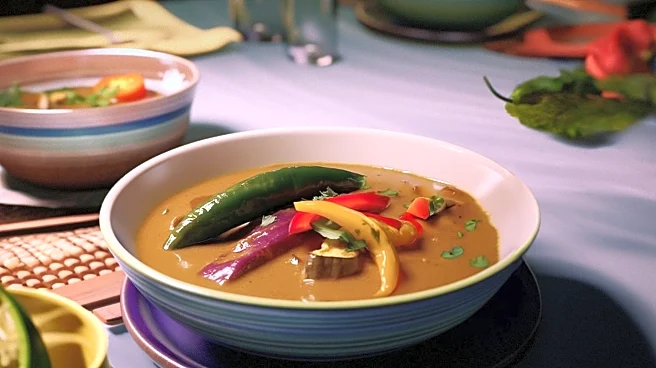What's Happening?
Narkara, a new restaurant specializing in Northern and Northeastern Thai cuisine, has opened in Union Square, New York City. The restaurant, led by executive chef Sakdiphat Mokkasak, offers a menu featuring dishes such as red curry terrine with pork, fermented pork sausage with chile dip, coconut pancakes with crab, and duck larb salad with foie gras. The establishment is designed with Thai elements, including bamboo detailing and themed dinnerware. Narkara joins other new culinary ventures in NYC, including Koju, an omakase counter at the Ace Hotel in Brooklyn, and Unglo, a Thai barbecue restaurant near Lincoln Center.
Why It's Important?
The opening of Narkara highlights the growing diversity and richness of New York City's culinary landscape, offering residents and visitors access to authentic Thai flavors that were previously less accessible outside of Queens. This expansion reflects broader trends in the restaurant industry, where unique and regional cuisines are gaining popularity. The presence of such establishments can boost local economies, attract food enthusiasts, and contribute to the cultural vibrancy of the city. Additionally, the focus on authentic Thai cuisine may encourage other restaurateurs to explore and introduce lesser-known international dishes.
What's Next?
As Narkara establishes itself in Union Square, it may influence dining trends and inspire other chefs to explore regional Thai cuisine. The restaurant's success could lead to further expansion or collaborations with other culinary ventures. Additionally, the presence of new restaurants like Koju and Unglo suggests a continued interest in diverse dining experiences, potentially leading to more openings and innovations in the NYC food scene. The reception of these establishments will likely impact future culinary developments and the city's reputation as a global food destination.
Beyond the Headlines
The introduction of Northern Thai cuisine in a prominent NYC location underscores the city's role as a melting pot of cultures and culinary traditions. It also raises questions about the sustainability and authenticity of ethnic cuisines in a globalized market. As restaurants like Narkara gain popularity, they may face challenges in maintaining traditional cooking methods while adapting to local tastes and sourcing ingredients. This dynamic can influence the evolution of ethnic cuisines and their representation in the culinary world.









